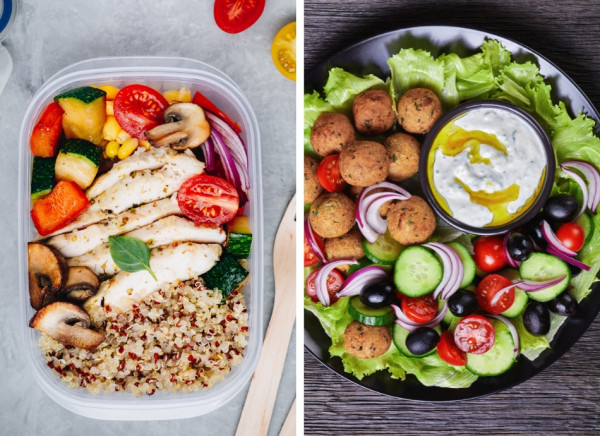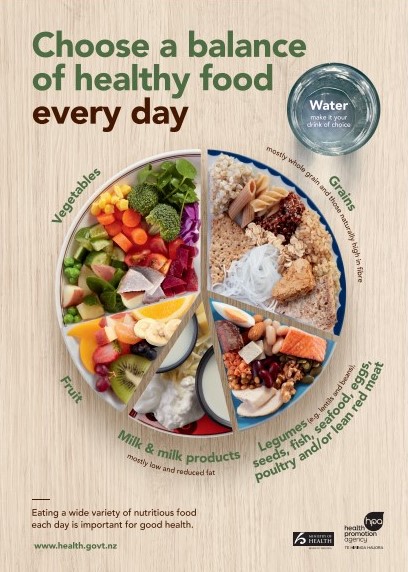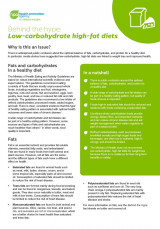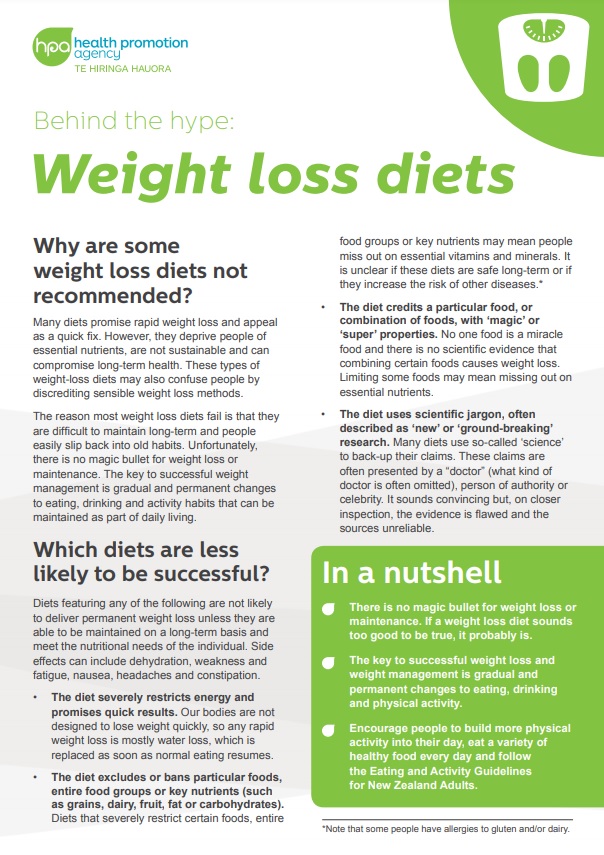Weight loss – which diet is right for you?
Key points about weight loss diets
- Managing your weight and being a healthy body size will benefit your health.
- There are many different diets and there is no single best approach for everyone.
- The best diet is the one that you can stick to over the long-term and where you have a healthy relationship with food and your body.
- Just because a weight loss diet is popular, it doesn't mean it's safe and suitable for you.
- If weight loss is your goal, focus on small, realistic changes to improve the quality of the foods you eat and your lifestyle.

There's a lot of debate about the 'best' diet for weight loss. However the latest science shows that there's no single best approach. We all have different genes, health conditions and lifestyles that impact on our ability to lose weight.
A sustainable weight loss diet
- Improves the quality of food you eat instead of just restricting calories.
- Encourages a regular and consistent pattern of eating.
- Is enjoyable and no foods are completely off limits.
- Is based around whole foods – vegetables, fruit, legumes, dairy products, meat, fish and whole grains.
- Includes plant foods – vegetables, nuts, seeds, legumes (eg, lentils and chickpeas), tofu, tempeh and edamame beans.
- Delivers balance, eg, when dishing up meals your plate is roughly ½ plate non-starchy vegetables, ¼ plate protein foods, ¼ plate carbohydrate foods.
- Limits the amount and frequency of highly processed and packaged foods consumed, eg, soft drinks, lollies, fast food and sweet/savoury snack foods.

Image credit: Canva
1. Will you be able to keep it up long-term?
Diets that promise quick results and leave you feeling hungry are hard to sustain. Plus, they’re more likely to deprive your body of essential nutrients. If you lose weight quickly, it will return as soon as you stop dieting.
Successful weight loss needs permanent, long-term changes to your eating habits and lifestyle. The best diet for weight loss is the one that you can embrace for life.
2. Do you need to buy special foods, pills, powders or supplements?
Get the basics of eating right and get your nutrition from food before taking supplements or special foods – unless advised by your healthcare provider. If a diet promises rapid weight loss, it will increase your risk of yo yo dieting (which is where you lose weight and then gain it back quickly).
Note: some healthcare providers may recommend shakes or meal replacement drinks and it's important to only do this with medical supervision.
3. What are the risks?
If you have specific nutrition needs, a history of eating disorders or a health condition (eg, heart disease or diabetes) and you're planning to make major changes to your diet, it’s important to talk to your healthcare provider first.
They can advise on the suitability and safety for you. It’s also important for you to continue to take any prescribed medicines. These are just as important for managing your health.
4. Does the diet remove any foods or food groups?
A successful weight loss diet doesn't need to be extreme.
Cutting out your favourite foods or completely removing food groups (eg, carbohydrates or fats) may mean you’re missing out on important vitamins and minerals. Successful long-term weight loss usually involves eating a range of food in moderation.
5. Does the diet encourage an overall healthy lifestyle and positive relationship with food?
Any diet that encourages disordered eating (eg, skipping meals) will impact on your relationship with food.
Regular exercise, getting enough sleep and managing stress affect your weight. Talk to your healthcare provider about ways to have an overall healthy lifestyle and positive relationship with food.
The Mediterranean diet encourages plant-based foods, for example:
- vegetables and fruit
- whole grains
- legumes, eg, lentils, split peas, chickpeas, kidney beans and baked beans
- nuts and seeds
- replacing butter with monounsaturated fats, mainly from olive oil
- moderate amounts of fish, chicken and dairy products, with little or no red meat.
A Mediterranean diet is effective for weight loss when followed for 12 or more months. The diet is consistent with Aotearoa New Zealand's Eating and Activity Guidelines(external link).
Research has shown that the traditional Mediterranean diet reduces the risk of heart disease and stroke and improves glycaemic (blood glucose) control in people with type 2 diabetes.

Image credit: Canva
The Dietary Approach to Stop Hypertension (DASH) diet was developed to help treat and prevent high blood pressure (hypertension).
The DASH diet emphasises:
- plenty of vegetables, fruits and low-fat dairy products
- moderate amounts of whole grains, fish, poultry and nuts.
The DASH diet is consistent with the Eating and Activity Guidelines(external link) and is an effective way to lose weight and become healthier at the same time. Studies have shown that the DASH diet lowers blood pressure, improves glycaemic (blood glucose) control and lowers the risk of heart disease and cancer.
Intermittent fasting involves periods of fasting (restricting food intake) and non-fasting. The most common example is the 5-2 diet. You eat normally for 5 days, and then eat less (500 to 600 calories per day) for 2 days of the week. Another common approach is the 16/8 diet where you aim to eat within a window of 8 hours per day and then you don't eat for the other 16 hours of the day. Over time, the diet reduces total energy intake, which may lead to weight loss.
Intermittent fasting can be as effective as other energy-restricted diets, and some people may find it easier to stick to. However, you still need to make healthy food choices on 'non-fasting' days. There has been very little research about the long-term effect of intermittent fasting on weight or health.
Side effects from 'fasting days' may include hunger, low energy levels, light-headedness and poor mental functioning. It's important to talk to your healthcare provider about whether fasting is safe and suitable for you.
Note: Intermittent fasting is not recommended for people with diabetes taking insulin or sulfonylureas due to the risks of hypoglycaemia.
If you follow a plant-based diet the main part of your meals will come from plant foods, eg, vegetables, nuts and legumes.
The term ‘plant-based’ covers a range of eating patterns including vegan, vegetarian and flexitarian (mostly vegetarian) diets. Types of plant-based diet depends on how many animal products (eg, meat, dairy and eggs) are included in the diet.
Studies have shown that various plant-based diets (not all exclude meat products, eggs and dairy) can lead to reductions in body weight, blood pressure and LDL cholesterol. They're also linked with a lower risk of heart disease.
Note: A plant-based diet is not automatically healthier. It's best to focus on choosing whole foods (eg, fruits, vegetables, and wholegrains) instead of processed or pre-packaged foods vegan and vegetarian foods.

Image credit: Canva
Low-carbohydrate diets involve restricting the amount of carbohydrate foods you eat.
Low carb diet
A low carb diet limits carbohydrate intake to about 40 to 130 g carbohydrate per day.
Non-starchy vegetables, meat, chicken, fish, eggs, nuts and seeds are encouraged. Highly processed foods, sugar, refined carbohydrates and starchy foods (eg, bread, pasta, rice and starchy vegetables – potato, taro and kumara) are limited or restricted.
There are parts of a lower carb diet that many people could benefit from, eg, eating fewer refined carbohydrate foods (eg, muffins, biscuits and white pasta) and eating more non-starchy vegetables. However, cutting out whole food groups, without a medical reason isn't normally necessary.
Note: For some people (eg, people with chronic kidney disease or people on certain medications, eg, empagliflozin) a low carb diet isn't suitable.
Ketogenic diet
A ketogenic diet, or ‘keto diet’, is a strict form of low carbohydrate diet that involves eating almost no carbohydrate foods (<50 g of carbohydrate per day), with the goal of moving your body into ketosis – where fat becomes your body's main energy source.
The keto diet is often high in meat (including processed meats, eg, sausages and bacon), eggs, cheese, fish, nuts, butter, oils, seeds and vegetables.
There is evidence to show that a ketogenic diet may be an appropriate therapy for people who have uncontrolled type 2 diabetes, or for children with epilepsy. However, there is also evidence to show that a ketogenic diet is associated with increasing LDL cholesterol and there's no evidence on the long-term effects or safety. Following this style of diet should only be done with the support and monitoring from a healthcare provider.
Note: This type of diet shouldn't increase your saturated fat intake from dairy, eggs and animal products.
A very low calorie diet (VLCD) is a medically supervised diet where you eat 800 calories or less a day for a short time (6 to 12 weeks). It involves replacing most meals with low-calorie, specially formulated shakes, soups or bars.
There's evidence to show that a VLCD can help with weight loss and improve glycaemic (blood glucose) control. However, you need to be careful when foods are brought back in, to make sure your weight loss in maintained.
Health professionals may recommend a very low calorie diet for rapid weight loss among adults who are obese (a body mass index (BMI) over 30 kg/m2) in special circumstances – for example, in preparation for surgery. Most people who need to lose weight shouldn't use a VLCD.
VLCDs may make you feel hungry and low on energy. Other side effects include hair thinning, tiredness, dizziness, cold intolerance, headache, constipation, diarrhoea.
- Most people put the weight they have lost on a VLCD back on soon after coming off the diet as they return to their previous way of eating.
- VLCDs are not suitable for:
- pregnant or breastfeeding people
- children (under 16 years of age)
- older people (over 65 years of age)
- people with serious medical and psychological conditions.
These diets have very little scientific evidence:
Instead of focusing on weight loss, focus on healthy habits that you can develop and maintain, eg, serving up more vegetables, drinking more water or building more exercise into your weekly routine.
If you need help to change your behaviour and advice on a way of eating that is right for you, talk to your healthcare provider, health improvement practitioner, health coach, registered dietitian or nutritionist.
Once you have achieved your weight, your focus should be on weight maintenance and having a positive relationship with food.
Popular diets review(external link) Health New Zealand | Te Whatu Ora, NZ
The Mediterranean diet(external link) HealthInfo Canterbury, NZ
Mediterranean-style diet(external link) Queensland Government, Australia
Which diet is right for you?(external link) Heart Foundation, NZ
Brochures
Behind the hype – weight loss diets(external link) Health Ed and Health Promotion Agency, NZ
Behind the hype – low carbohydrate high-fat diets(external link) Health Ed and Health Promotion Agency, NZ
References
- Popular diets review(external link) Health New Zealand | Te Whatu Ora, NZ, 2024
- Comparison of diets(external link) NZ Nutrition Foundation, NZ, 2022
- Eating and activity guidelines for New Zealand adults(external link) Health New Zealand | Te Whatu Ora, 2023
- Diet reviews(external link) The Nutrition Source, Harvard Health, US, 2022
- Weight loss – choosing a diet that's right for you(external link) Mayo Clinic, US, 2023
- Weight loss – a healthy approach(external link) Better Health Channel, Australia, 2024
- Dinu M, Pagliai G, Angelino D, et al. Effects of popular diets on anthropometric and cardiometabolic parameters – an umbrella review of meta-analyses of randomized controlled trials(external link) Adv Nutr. 2020;11(4):815-833
- Ge L, Sadeghirad B, Ball GDC, et al. Comparison of dietary macronutrient patterns of 14 popular names dietary programmes for weight and cardiovascular risk factor rreduction in adults – systematic review and network meta-analysis or randomised trials(external link) BMJ 2020;369:m696
- Termannsen A-D, Clemmensen KKB, Thomsen JM, et al. Effects of vegan diets on cardiometabolic health – a systematic review and meta-analysis or randomised controlled trials(external link) Obesity Reviews 2022;23(9):e13462
- Wang Y, Liu B, Han H, et al. Associations between plant-based dietary patterns and risks of type 2 diabetes, cardiovascular disease, cancer, and mortality – a systematic review and meta-analysis(external link) Nutr J 2023;22:46
- Patikorn C, Siadoung P, Pham T, et al. Effects of ketogenic diet on health outcomes – an umbrella review or meta-analyses of randomized clinical trials(external link) BMC Med. 2023;21:196
- Kim JY. Optimal diet strategies for weight loss and weight loss maintenance(external link) J Obes Metab Syndr. 2021;30(1):20-31
- Obesity and weight loss management –a radically different way of managing chronic metabolic diseases(external link) Research review, NZ, 2020
- Weight loss – the options and the evidence(external link) BPAC, NZ, 2019
- Lean MEJ, Leslie WS, Barnes AC, et al. 5(external link)-year follow-up of the randomised Diabetes Remission Clinical Trial (DiRECT) of continued support for weight loss maintenance in the UK – an extension study(external link) Lancet 2024;12(4):233-246(external link)
- Clinical guidelines for weight management of New Zealand adults(external link) Ministry of Health, NZ, 2017
Brochures

HealthEd, NZ, 2020

Behind the hype – low carbohydrate high-fat diets Health Ed and Health Promotion Agency, NZ, 2020

HealthEd, NZ and Health Promotion Agency, NZ, 2019
Credits: Healthify editorial team. Healthify is brought to you by Health Navigator Charitable Trust.
Reviewed by: Lily Henderson, Registered Dietitian
Last reviewed:





